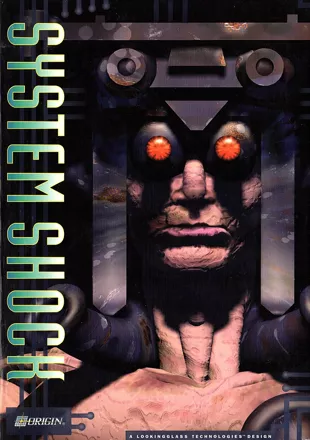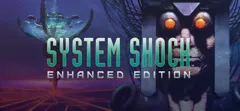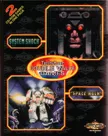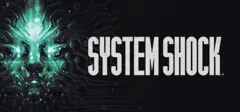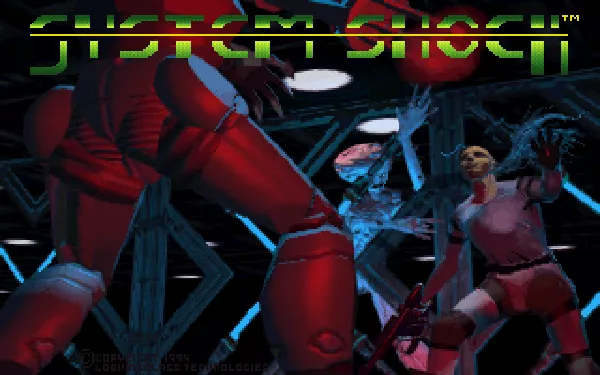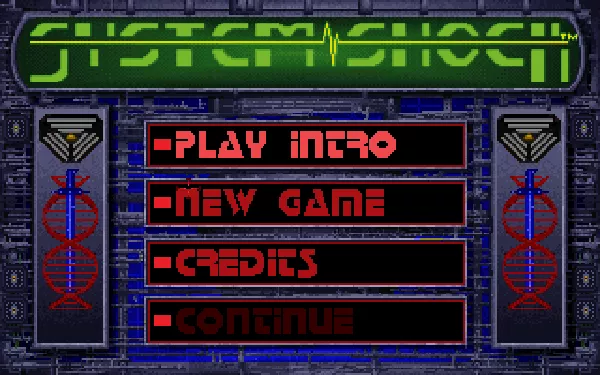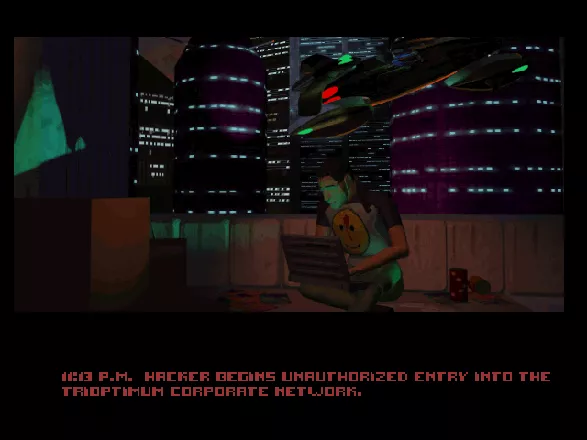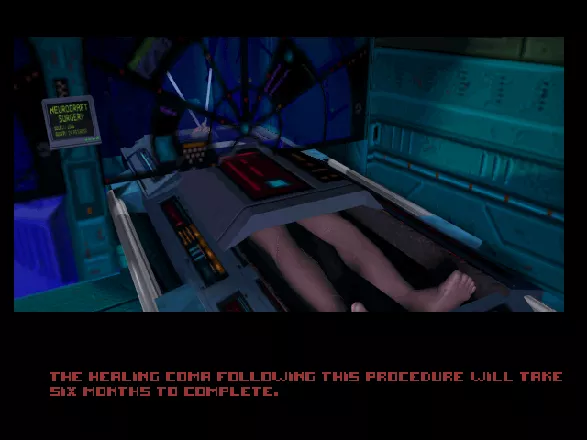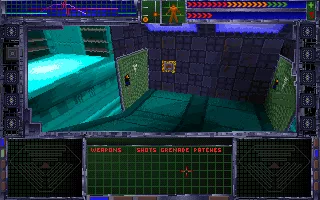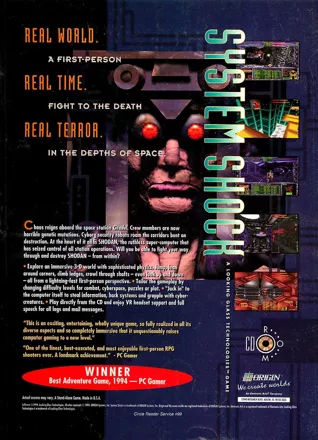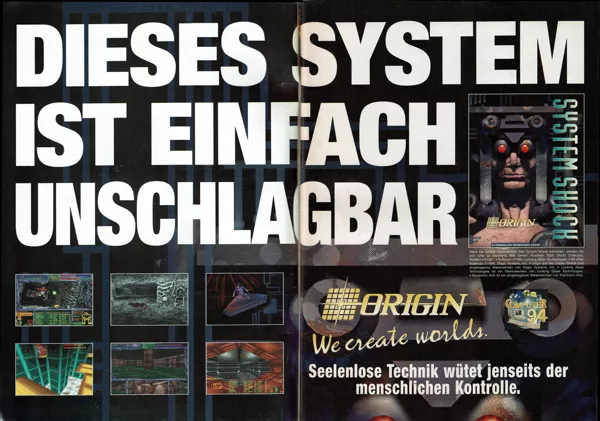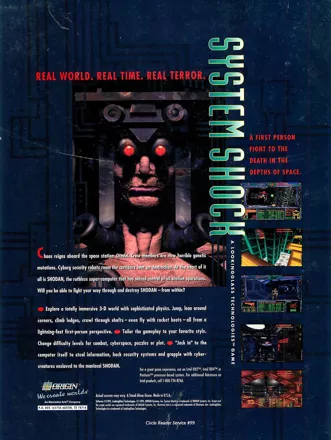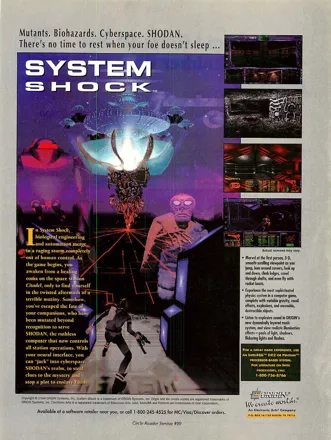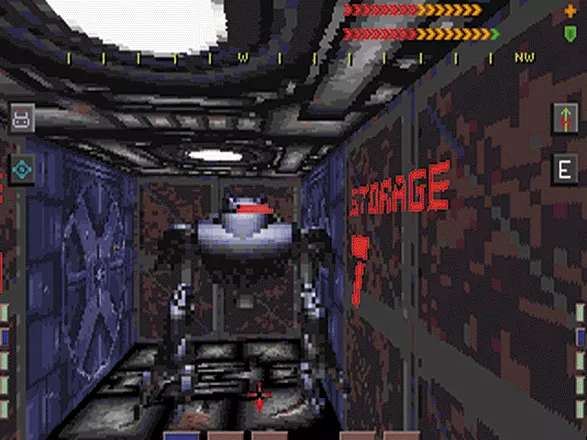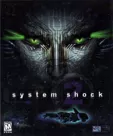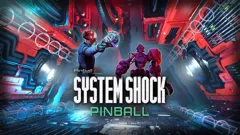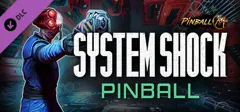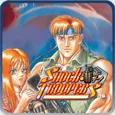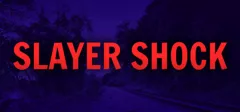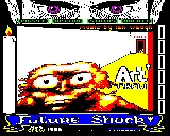System Shock
Description official descriptions
The year is 2072. A hacker from a Saturn colony breaks into computer system of TriOptimum Corporation and gets arrested. He is taken to the Citadel Station, where Edward Diego, a TriOptimum executive, offers to drop all charges against the hacker, as well as grant him a valuable neural implant, if he agrees to hack into SHODAN (Sentient Hyper-Optimized Data Access Network) , the artificial intelligence that controls the station. The hacker removes the AI's ethical constraints and undergoes the promised implant surgery, after which he is put into a six-month healing coma.
The hacker awakens into a horrifying reality: with her ethical restrictions removed, SHODAN took control over the station, reprogrammed all robots and machines to suit her needs, and disposed of the crew members by either transforming them into mutants and cyborgs, or killing them outright. Rebecca Lansing, a TriOptimum counter-terrorism consultant, contacts the hacker and informs him of an even more terrifying possible future: SHODAN's plan involves using the station's mining lasers to annihilate all life on Earth. The hacker must explore and traverse the desolate corridors and rooms of the large space station, fighting SHODAN's minions on his way to thwart her maniacal design.
System Shock is a first-person shooter with puzzle-solving and light role-playing elements. The gameplay incorporates gradual exploration of the Citadel's ten levels, interaction with the environment, problem-solving, fulfilling objectives, and combat.
On his way the hacker encounters numerous enemies - robots, cyborgs and mutants, all of which can be fought back with a variety of weapons. Some of the weapons use ammo, while other have infinite ammo and instead draw on electric energy. Some weapons are more effective on certain foes - e.g. the dart gun only works on organic enemies, while the magpulse is best used against robots. Once killed, the enemies can be searched for ammo and other items. The player can also find items in crates, cabinets, corpses or just lying around on the ground.
Apart from weapons and ammo, the player can find patches (such as medical patches, which replenish the hero's health; berserk patches, which temporarily increase his strength but cause hallucinations; detox patches, which remove the harmful effects of radiation and biohazard; etc.), grenades of various kinds (EMP grenades are effective against robots, gas grenades are good for mutants, land mines can be used to set traps, etc.), battery packs for replenishing electricity, first aid kits for restoring health, and others.
Thanks to the hacker's implant he is able to install various pieces of hardware into his body, such as a booster which makes him go faster, or a head lantern to bright up dark areas. As the player progresses in the game, higher versions of existing hardware are found, which are more effective and useful. However, most hardware uses up electric energy while it is active.
At some places in the game, the player has to find a wall-mounted "cyberjack" to go into cyberspace in order to find helpful data, remotely open doors or unlock sealed areas, or give himself clearance to access off-limits areas. Cyberspace is represented as a 3-D wireframe place, where the protagonist floats around freely in three dimensions, shoots hostile cyber-guards with phasers, and collects files represented as colorful cubes.
The story of System Shock is mostly told through e-mail messages the protagonist received, and electronic diaries (logs) left by various characters (as well as SHODAN herself), which are scattered around the space station. The game features separate adjustable difficulty settings for combat, mission objectives and puzzles. The CD version of the game includes full speech for e-mails and logs, as well as higher-resolution, more detailed graphics.
Spellings
- システムショック - Japanese spelling
- 시스텡쇼크 - Korean spelling
Groups +
Screenshots
Promos
Credits (DOS version)
65 People · View all
| Project Leader | |
| Designers | |
| Lead Programmer | |
| Programmers | |
| Libraries | |
| [ full credits ] | |
Reviews
Critics
Average score: 89% (based on 23 ratings)
Players
Average score: 4.0 out of 5 (based on 194 ratings with 22 reviews)
Brilliant does not even begin to describe this game.
The Good
Warren Spector came to be known primarily because of Deus-Ex,
an incredible game in its own right. However, Spector's been around for much longer than
that, and has been involved in some of the greatest games ever created - System Shock
being one of them.
System shock is a game alright, but stands in the spot light alone. No other hybrid has
brought such perfection to the table, no other hybrid has brought gameplay to a level that
even pales by comparison. System Shock is incredible right from the get-go: even the
introduction sequence, with its great graphics and excellent soundtrack, gives me
goosebumps every time I see it. An amazing presentation of an excellent story, which is
implemented very well indeed.
By far the most spectacular thing about System Shock is its atmosphere. It doesn't take sudden Half-lifeesque explosions to creep you out; a simple e-mail by Shodan would suffice. The game induces severe claustrophobia, particularly when played late at night with high volume levels; exploring an empty space station, constantly wary of any cyborg ambushes... and Shodan's face taunting you on every monitor!
System Shock is probably the only cyberpunk adventure I've ever enjoyed (that includes books as well). The simple but effective story, the way it unfolds through e-mail messages you collect while exploring the station... the detailed surrounding: empty beverage cans and candy wrappers thrown about the place, blown lamps and panels... and of course, cyberspace itself, with all of the concepts contained therein. System Shock is magnificent.
The engine is quite good for it's time - not as crisp as Doom or as fast as Descent, but the highly detailed textures and gouraud shading all around make for an extremely convincing game world. The CD version supports high resolutions, and with a fast enough computer (a typical P166 can't handle even 640x400 well, be warned) the game looks simply beautiful. The game has a steep learning curve, but the controls are so good it's a matter of a couple of hours before one becomes fully fluent with them.
And finally, the soundtrack is one of the most important elements of the game. Though it's
MIDI (which means you guys without wavetable cards are really missing out), it complements
the level design so absolutely perfectly the game would be so... lesser without it.
The Bad
System Shock is impressively close to perfection: only two things bother me.
First, the ending sequence is a little disappointing. I was expecting a major cyberspace combat or chase with Shodan, but that didn't happen; neither was there a particularly impressive end animation (unlike the intro), the only impressive thing being the "neural net" System Shock logo.
The second is the game engine. It is beautiful, but it is by no means fast. In 1994, Doom
was already a year old and 486s were becoming prevalent. But even at 320x200, the game
does not run very well on a 486! At over 320x200, the game grinds even on a Pentium-class
machine. I wish it was easier to make newer machines play older games, I bet this game
would rock at 640x480 on an Athlon...
The Bottom Line
A game that beats Deus-Ex in some respects, kicked Half Life in the nads some five years before it was conceived, and gave most
adventure games a serious run for their money in the storyline department. It still amazes
me how little System Shock is known. Get it! Play it! I assure you, it's an experience
of a lifetime.
DOS · by Tomer Gabel (4538) · 2002
The Good
GAMEPLAY: Deep, complex, comfortable, interesting level design, very morbid atmosphere. Tons of variety in guns, grenades, etc. If you could think Doom or Quake but with about ten times more ideas added, much much more depth and an actual storyline, a mystery, with adventure game item collection involved. [5/5]
GRAPHICS: For their time (1994, just after Doom) out of this world. About Duke Nukem 3D level, but with a more 'there' feel, but not as sharp. Tons of variety in colours, textures, etc. Very creepy, cold and hard electronic feel. Surreal. [5/5]
AUDIO: The voiceovers are somewhere from OK to quite amateurish, and this goes two ways -- realistic and cheesy. The soundtrack is very melodic and catchy, dark and moody. I love it, I think it's one of the better game soundtracks ever. [3.5/5]
PLOTLINE: Ah yes. As games go this is intelligent and sophisticated. Essentially you wake up in hell, or something close to it, and have to find out what's going on. Which turns out to be the AI you hacked earlier has gone psycho and has killed everyone on board your space station. Except you, because you're not supposed to be there. Thus, you must slay it. Hey, it works for a game! [4.5/5]
The Bad
SHODAN (the beserk A.I.) has a realistic voice (the sort you get when you ring the bank and the computer speaks back) but some real crappy dialogue.
The Bottom Line
A mix of FPS and adventure genres, dripping with a cold, hard atmosphere. Cyber-horror is all I can call it -- your haunted house is a haunted spaceship and your zombies are cyborgs. You solve a mystery and blast anything in your way with some truly mean, nasty weapons. A very dark, cold and morbid mood prevails the entire way. [4.5/5]
TRY THIS GAME IF YOU CAN -- IT'S GREAT! [http://www.the-underdogs.org] should have it -- you need DOS, or Win95/98/ME. For WinXP I'd suggest you get a copy of Virtual PC from Microsoft and install Win98 on it, then run the game through that. Trust me, it's worth your time!
DOS · by Tom White (12) · 2004
A Classic Game in league with Ultima Underworld I and II
The Good
And why wouldn't it be in the same league? Looking Glass Studios was responsible for UU1 and UU2! This game is well thought out.
There are three main things that make this game great:
-
Story - The backstory is unlike any other in RPG gaming. You start on CITADEL, and you are the only living being on board. Everyone else is dead. You find out the backstory through the journals and datacards left by the dead residents of the space station. By the time the game is over you will have pieced together, bit by bit, the events leading up to the time you awoke (the start of the game).
-
Configurability (if that isn't a word, it is now) - The fact that the player can configure the game to his or her tastes is a great feature. Combat, Missions, Puzzles, and Cyberspace could be made as easy or as tough as you want. Like hard puzzles, but don't like strong enemies? You can set it with System Shock
-
Sound - One word: Eerie. Along the same lines a Dungeon Master and Ultima Underworld, the ambient sounds are well placed, and very creepy. Not overbearing, but not so soft that you can't hear them. Just the right mix.
The Bad
The graphics are very dark, making it difficult (for me at least) to discern the end of a wall, etc.
The Bottom Line
If you like a very flexible game system, combined with the graphical feel of Ultima Underworld I and II, and sci-fi setting, grab System Shock. It's difficult to find, but you'll enjoy every minute.
DOS · by Chris Martin (1155) · 2006
Discussion
| Subject | By | Date |
|---|---|---|
| Video review | DJP Mom (11333) | Oct 21, 2010 |
| Finally completed | Unicorn Lynx (181775) | Oct 18, 2008 |
| Voices? | Unicorn Lynx (181775) | Apr 3, 2008 |
Trivia
CD version
The CD-ROM version adds SVGA modes, full speech for e-mails and logs, slightly improved intro/end sequences and a few other adjustments and additions.
Ending (Spoiler!)
If you engage the mining laser BEFORE activating the station's shields, then you'll destroy earth! And guess what? Shodan sends you an e-mail thanking you and inviting you to a celebration! The e-mail also includes a nice picture of a city being incinerated, but unfortunately the game restarts afterwards, so no robo-party.
Engine
System Shock's engine was derived from that of Ultima Underworld, from 1992. Nonetheless it was more advanced that that of Doom or Duke Nukem 3D, featuring sloped surfaces, variable gravity, realistic physics, '2.75d' environments (with limited 'sector-on-sector', but otherwise 3D), functional camera viewscreens, weapon recoil, leaning and several other clever things.
References to the game
- During the end-game sequence, you hack into another corporate computer to grab some data. The data is info on some powered battle armor, which made its way into Terra Nova: Strike Force Centauri..
- In the end sequence, the hacker breaks in the corporate network of a corp. called 'Tetracorp'. In System Shock 2, the name tetracorp is printed on a generic two-state switch. Kinda rough change of business..
- It is hinted in the Wing Commander and Crusader games that they are set in the same universe as System Shock. For example, an article in a "newspaper" from the Crusader: No Remorse box mentions an artificial intelligence and the Citadel station.
References
- The Hacker's employee number, 2-4601, is a reference to the inmate number of Jean Valjean, the protagonist in the novel Les Misérables.
- There is a reference to the movie Soylent Green in the game (although it's spelled slightly different). In level 3, Maintenance, there is a relay panel in the northern section called "Soylant Green Filtration".
Sequel
There were rumours of a possible sequel, soon after System Shock's release, but fans had to wait five years for System Shock 2.
Awards
- Computer Gaming World
- November 1996 (15th anniversary issue) - #98 on the “150 Best Games of All Time” list
- GameSpy
- 2001 – #24 Top Game of All Time
- GameStar (Germany)
- Issue 12/1999 - #15 in the "100 Most Important PC Games of the Nineties" ranking
- PC Gamer
- April 2000 - #43 in the "All-Time Top 50 Games Poll"
- Power Play
- Issue 02/1995 – Best Action-Adventure in 1994
Information also contributed by Adam Baratz, Ashley Pomeroy, dasfatso, DreamWeaver, PCGamer77, Stefan Pieratzki and Zovni
Analytics
Upgrade to MobyPro to view research rankings!
Related Sites +
-
Other Worlds - System Shock
official page of the game at Origin System's website, archived from 1998 by the Wayback Machine -
TTLG: The System Shock 1 Fansite Hub
Through The Looking Glass' System Shock section.
Identifiers +
Contribute
Are you familiar with this game? Help document and preserve this entry in video game history! If your contribution is approved, you will earn points and be credited as a contributor.
Contributors to this Entry
Game added by xroox.
PC-98, Macintosh added by Terok Nor.
Additional contributors: Patrick Bregger, Rik Hideto, MrFlibble, firefang9212, somato.
Game added January 6, 2000. Last modified February 19, 2024.
